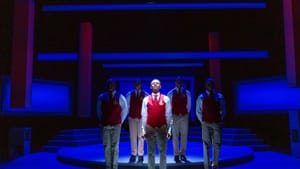Stay in the Loop
BSR publishes on a weekly schedule, with an email newsletter every Wednesday and Thursday morning. There’s no paywall, and subscribing is always free.
A singing performance
Philadelphia Theatre Company presents Tarell Alvin McCraney’s Choir Boy

In 2018, Philadelphia Theatre Company (PTC) was lauded for committing to produce at least one play per year from the Kilroy List, which catalogues under-produced works by trans, nonbinary, and/or women writers. The following year, PTC lost much of that goodwill when it announced, and was broadly condemned for, a 2019–2020 season featuring all white playwrights—just before the pandemic swept the theater scene. Seemingly in acknowledgement of this criticism, in late 2021, PTC kicked off a three-play season featuring two plays by women (one white, one Indigenous) and a Black man. That third production, Tarell Alvin McCraney’s Tony-winning Choir Boy, is currently on stage at the Suzanne Roberts Theatre.
Who’s onstage—and in the audience
PTC is far from the only area theater company that has a history of almost exclusively, if not intentionally, mounting works by white artists. And the problem extends beyond the people producing theater in Philadelphia: theater audiences are also mostly white. My fellow white audience members and I often sit with people who look like us and watch people on the stage who look like us perform plays written by people who look like us.
Which is part of what makes PTC’s production of Choir Boy so arresting.
Choir Boy features a cast of seven actors, six of whom are Black, most of whom are young. It has a Black playwright (McCraney) and director (Jeffrey L. Page). It features Black music, from spirituals to soul. It is set in an all-Black boys’ prep school. It examines masculinity and sexuality from a Black perspective.
On opening night, I thought about how rare these onstage circumstances are to most theater audiences—even an audience in a city like Philadelphia, where white people are a minority.
Performances that sing and shine
Choir Boy is not a musical by conventional terms, but, as the name suggests, music is central to its story. The action follows its storied a cappella choir and takes place over the course of one year, from graduation ceremony to graduation ceremony.
Pharus Young (Justen Ross), a rising high-school senior with a beautiful tenor and a seemingly unflappable sense of self, has been newly selected as the choir’s leader. His headmaster (Akeem Davis) believes in Pharus’s talents but encourages him to “tighten up,” his way of discouraging any behavior not seen as appropriately masculine for “a Drew man.” Pharus has other defenders, too, most notably his roommate, AJ (Jamaal Fields-Green), as well as Mr. Pendleton (PJ Benjamin), the semi-retired white teacher who marched with Dr. King but is also skilled at putting his foot in his mouth.
Some of Pharus’s fellow choir members (Jeremy Cousar’s Bobby and Tristan André’s Junior), whether out of jealousy or bias, seem out to embarrass or even sabotage their choir leader … and one, David (Dana Orange), just wants to be left out of it.
Scenic and lighting designer Christopher Ash’s sets are spare and versatile, with the choir risers cleverly doubling as dormitory beds and a collection of open-sided cubes sufficing any time chairs are called for. There is a raised box at the top of the stage, lit around the perimeter to set it apart from the rest of the set, and half-walls fly in from the ceiling. Its simplicity allows the performers to shine.
More shows like this
But to say more about the plot or the show’s thoughtful design won’t do justice to the production, or Page’s skilled direction.
I’d rather note how mesmerizing Ross’s hands are when he moves them as he sings, and how Orange’s face can break your heart in a thousand different ways. Or how Davis’s voice swings from a warm hug to a sharp knife in an instant. Some of composer and music director Crystal Monee Hall’s harmonies are so beautiful, you may cry when you hear them.
I’ll also note the exquisite state of discomfort white audience members like me might feel, seeing a story so very different from our own and realizing how often it’s missing onstage—one reason it is so important that we are in the audience, besides enjoying the work of this show’s artists.
We need more productions like Choir Boy. I hope that PTC, and the broader Philadelphia theater community, continue to mount them.
Don't miss BSR podcaster Darnelle Radford's interview with Choir Boy director Tarell Alvin McCraney.
What, When, Where
Choir Boy. By Tarell Alvin McCraney, directed by Jeffrey L. Page. $45 ($10 for essential workers). Through March 13, 2022, at the Suzanne Roberts Theatre, 480 South Broad Street, Philadelphia. (215) 985-0420 or philadelphiatheatrecompany.org.
Audiences are required to show proof of Covid-19 vaccination, and face masks are required regardless of vaccination status. A performance on Friday, March 4, 2022, will be capped at 25 percent of normal capacity.
Accessibility
The Suzanne Roberts Theatre is a fully accessible venue, with automatic entryways, box office windows at wheelchair level, and elevator access between floors. There will be an audio-described performance on Wednesday, March 9, an ASL-interpreted performance on Thursday, March 10, and an open-caption performance on Saturday, March 12.
Sign up for our newsletter
All of the week's new articles, all in one place. Sign up for the free weekly BSR newsletters, and don't miss a conversation.

 Jillian Ashley Blair Ivey
Jillian Ashley Blair Ivey